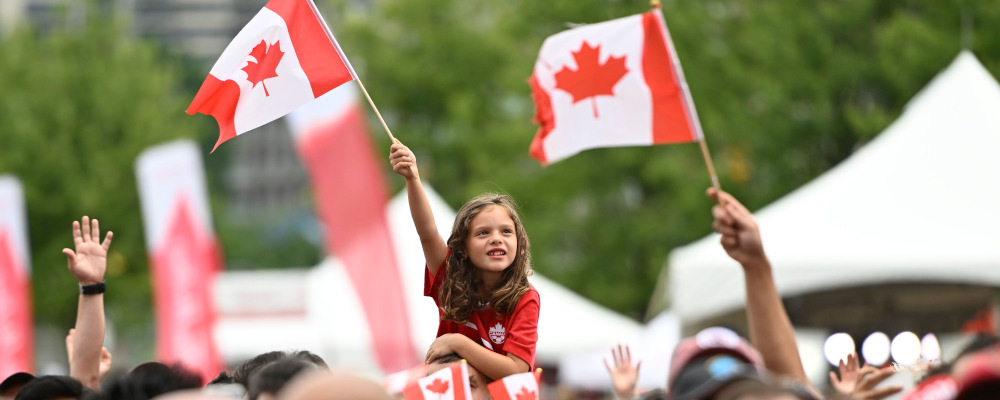It can be a humbling odyssey to raise Canadians to know their country—especially if you’re raising them in Canada. When Jack Granatstein fired his impassioned salvo a quarter century ago, I was already on the ramparts, working on various Dominion Institute documentaries alongside The Hub’s executive director, Rudyard Griffiths. I was all too familiar with the institute’s polls that showed again and again that Canadians were largely strangers in their own land, oblivious to the why and who and when and what had happened to create this incredible political and cultural miracle in North America. I was determined to make sure my daughters would grow up consciously Canadian.
The sheer intensity of the night feedings and the ear infections and the diaper changes compelled me to take stock, and I decided to hold off on introducing the concept of responsible government until after toilet training was completed. This would be a long campaign of skirmishes. I had no master plan.
In those early, formative years, I learned the sheer scale of the obvious. We don’t just live next door to the world’s dominant cultural extravaganza; we live right inside American culture. It is fused into our neurons, like a birthright, and it’s not an invasion—it’s a willing seduction. I did what I could to buy Canadian alphabet books and maps and I scoured the dial (as it was then) for Canadian TV, but the distinctions were subtle and my children couldn’t care less which books or movies were American or Canadian, as long they were entertained. Indeed, for a viewing season, the city of London—thanks to Peter Pan, The Great Mouse Detective, 101 Dalmatians, and The Lion, the Witch and the Wardrobe was the most vivid place in the world for them. I could never find a Canadian equivalent of all those wonderful stories. And incursions would come from out of the blue.
On one trip to New York my youngest was enlightened by a well-meaning U.S. immigration officer at the airport about some magical creature called American Doll. We now had no choice but to find the humungous spawning centre in Manhattan—entire floors of the thing—where my daughter bought her own special companion, each one fiendishly fashioned to have the same hair, skin, eye colour as the owner. I was instructed by the other member of the household management team to cease and desist all rants of cultural invasion.
So while waiting for those precious openings to talk about, for instance, Mackenzie King and his penchant for seances, this business of raising Canadians was also calling for restraint on my part. After a class trip to see an animated movie, my eldest, then in grade four, returned home happily singing the film’s theme song which included the cheery line, “We’re the kids in America.” I wanted to shout, “No you’re not!” But I let it go. Maybe she’d forget it. She did. Clever me. On another day, my youngest returned from school singing about taking country roads “home” to West Virginia. Again, I wanted to rage but held my tongue. Choose your battles.
I fell to my knees in gratitude when her music teacher introduced the class to folk songs from Quebec and Newfoundland. The resistance! The first time we watched the CBC’s hit sitcom, “Kim’s Convenience”, I remember with a measure of dismay how my youngest exclaimed in delight, “Hey, that’s Toronto!” Yes indeed, that is an amazing, strange and very Canadian experience to see your world suddenly reflected, validated, reinforced in your own culture. I remember with more dismay when one of my young nephews who had discovered the incredible world of Marvel and DC comics, piped up one day, “How come all these superheroes are in New York? How come they’re never in Toronto?” It is to weep!In 2018, I discovered a wonderful Canadian-made self-published comic book called “Group of 7” (created by Chris Sanagan and Jason Lapidus) featuring the fictionalised World War 1 exploits of notable Canadians like Frederick Banting, Norman Bethune, Francis Pegahmagabow, and Lester Pearson. My nephews loved it.
Raising conscious Canadians in Toronto is made more difficult by the lack of any strong sense of place or of geography. We don’t have Vancouver’s mountains or Victoria’s inlets or a harbour, like St. John’s or Halifax’s, that hasn’t been walled off by condos or the great river that encircles Montreal. Toronto has modest amounts of historical architecture but nothing compared to Ottawa or Quebec City, so I couldn’t even point to landmarks when we went out for family walks; and when we did, successful indoctrination was not always guaranteed.
One promising Sunday afternoon, I demanded we spend Father’s Day in the Winchester Necropolis. While marching my brood to behold George Brown’s headstone (Father’s day, they had no choice) we kept encountering endless gravestones for very young children; as if every single diseased 19th century Torontonian had been buried here. My daughters began to wonder, then worry, then panic that they too would die untimely deaths. I had to abandon the mission in search of life preserving ice cream.
My most successful excursion came when I took them to see Brock’s Monument in Niagara Falls. It worked because I had my daughters standing in the exact spot where grand adventures had happened. “The Americans came down those hills right there and crossed that river right there and climbed up these hills beneath us and Brock died in this very forest.” For a brief shining moment, I was able to capture their imaginations until they demanded we head off to the hotel pool. I wisely complied.

In this long campaign, I came to understand how little support I was getting from the provincial curriculum in Ontario, where Canadian history makes fleeting appearances. I waited with bated breath for Grade 7 and the section on New France but that proved to be a disaster. The very nice teacher was out of her depth. I did my best to fill in gaps but those incredible stories were dying in the class room. Grade 10 brought redemption. The history teacher was passionate, committed, and inspired my youngest which made it possible for me to add my own enthusiasm, sparking a virtuous cycle. I helped her with projects on conscription and World War 1 and the 1995 referendum and she was amazed to learn the stories, see the connections resonating into the present day. But this excellent adventure was contingent on the teacher, not surprisingly, and I know all too well, I am not an education system.
Allow me to end with one final anecdote. For much of my daughters’ early lives, I was writing a book about Lester Pearson and may have mentioned him in passing at dinners, walks to school, movie line-ups, subway delays. One day my youngest, who had betrayed me so cruelly with her devotion to American Doll, casually mentioned that the school librarian had made a presentation about the flag. He had asked the kids if they knew where the Maple Leaf came from. I’m sure he expected the usual collective silence. But my daughter’s hand shot up and she spoke about Pearson and the flag debate and the original design with three leaves and blue bars and even the Red Ensign. Apparently, the teacher was startled. Perhaps he felt an urge to call Children’s Aid. When she told me this, my daughter was glowing. I glowed that day too. Good God! She had actually been listening, taking it in. Small victories are good victories.
We live in dysfunctional times in a curious country where the current narrative demeans or denies the incredible things we have done together. But, mercifully, the pendulum inevitably shifts, conventional wisdoms rot, the revisionists are themselves revised. Perhaps it is possible that the provincial ministries will come to their senses and make Canadian history mandatory across the Dominion in every year of primary and secondary school. I can dream and I do.Since my own journey raising Canadians, social media has erupted and now the resistance is much more pervasive, varied and creative. Who could have imagined podcasts in those primitive days of linear television and radio? So Canada is out there, dear parents. Your kids probably already know how to find it. Until then, we cannot indulge in despair. We need to stay on the ramparts so that one day, a future historian can write a charming polemic entitled, Who Brought Canadian History Back to Life?
Recommended for You

Falice Chin: The ‘wild and weird’ Calgary Stampede

‘A celebration of the spirit of Alberta’: Ryan Hastman on the political, economic, and cultural importance of the Calgary Stampede

Stephen Staley: Squid Game was a warning to itself

Ginny Roth: How vacant liberal nationalism left Canada worse off than George Grant even imagined




